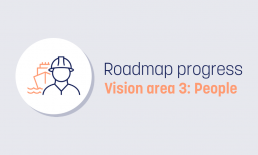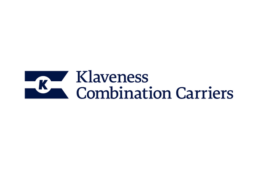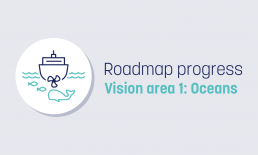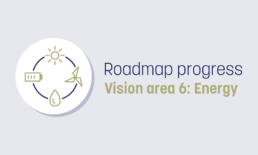Magna Carta for Filipino Seafarers
Progress against milestone 3.2020.5:
Workers across all phases of ship lifecycle, onboard and offshore, have access to union representation and their working and living standards are improved.
The Philippines House of Representatives has voted in a bill that seeks to protect the rights and interests of Filipino seafarers.
The law, Magna Carta for Filipino Seafarers’ sets out labour protection terms for seafarers before, during, and after employment.
Source: Philippine News Agency
Klaveness Combination Carriers signs on as the latest Sustainable Shipping Initiative member
London/Oslo, 12 April 2023 – Klaveness Combination Carriers (KCC) announces today that it has become the latest shipowner to join the Sustainable Shipping Initiative (SSI). KCC becomes part of a growing community of leaders across the shipping ecosystem working together to catalyse progress toward a sustainable maritime sector.
A multi-stakeholder initiative, the Sustainable Shipping Initiative (SSI) brings together leading organisations with shared goals and an equal determination to improve the sustainability of the shipping industry in terms of social, environmental, and economic impacts. Ranging from NGOs to shipowners, charterers, banks, and classification societies, SSI members work toward the milestones laid out in the Roadmap to a sustainable shipping industry.
KCC is committed to being a driver in the transition towards low carbon shipping and is steadfast on exceeding IMO’s current 2030 and 2050 ambitions. The company strives to solve maritime inefficiencies by maximising the utilisation of its fleet of combination carriers to minimise ballast between laden voyages by consecutively switching between dry and wet cargo shipments. It is furthermore implementing a comprehensive energy efficiency programme across its fleet using innovative and cutting-edge technology.
“The complex sustainability challenges that shipping faces today require collaborative, multi-faceted solutions that address environmental, social and socio-economic concerns.” Andrew Stephens, SSI’s Executive Director, said. “We welcome Klaveness Combination Carriers to the SSI community and look forward to learning from their current initiatives spanning across safety, the ship lifecycle, and energy efficiency, which are in line with SSI’s current work programmes. By working with KCC, we hope to influence and shine a light on actionable changes the sector can make, amplifying the positive impact of company actions for a more sustainable future.”
KCC’s CEO, Engebret Dahm, comments: “We are pleased to join as members of SSI and share in the strong ambitions of SSI to improve sustainability in our industry by strengthening seafarers’ rights and wellbeing, promoting transparency and accountability, and speeding up decarbonisation of shipping. We believe collaboration with other like-minded companies across the shipping industry is key to succeeding with these ambitions and look forward to KCC’s active participation in SSI together with SSI’s other esteemed members and secretariat.”
On 22-23 March, KCC joined members in Geneva for SSI’s bi-annual in-person member meeting, an opportunity for members to come together and progress SSI’s work and learn from one another. Hosted by Bunge, the meeting welcomed three new members: Klaveness Combination Carriers, Swire Bulk, and the Vancouver Fraser Port Authority. A summary of the two-day gathering is available here.
- ENDS -
Notes to Editors
For more information, interviews or comment please contact Elizabeth Petit, Head of Communications & Partnerships, Sustainable Shipping Initiative (e.petit@sustainableshipping.org) and Daniel Middleton, Head of Corporate Communications, Torvald Klaveness (dmi@klaveness.com)
About the Sustainable Shipping Initiative
The Sustainable Shipping Initiative (SSI) is a member-led group of leaders catalysing change across the maritime ecosystem. Since 2010, SSI has brought together shipowners, operators and managers; banks and financial stakeholder; cargo owners; classification societies; non-profits; ports; and service providers to advance environmental, social and economic goals for a sustainable shipping industry.
About Klaveness Combination Carriers ASA:
KCC is the world leader in combination carriers, owning and operating eight CABU and eight CLEANBU combination carriers. KCC’s combination carriers are built for transportation of both wet and dry bulk cargoes, being operated in trades where the vessels efficiently combine dry and wet cargoes with minimum ballast. Through their high utilization and efficiency, the vessels emit up to 40% less CO2 per transported ton compared to standard tanker and dry bulk vessels in current and targeted combination trading patterns.
Download this press release as a PDF
SSI members meet in Geneva
28 March 2023 – SSI members and guests gathered in Geneva on 22 – 23 March 2023 for the bi-annual SSI in-person member meeting, kindly hosted by SSI member Bunge at their Geneva offices.
The two days presented an opportunity for members to meet and learn from each other, especially for the new additions to the SSI family: Klaveness Combination Carriers, Swire Bulk, and Vancouver Fraser Port Authority. Members explored the sustainable shipping landscape and discussed ongoing and potential focus areas, and shared their own companies’ initiatives, challenges and successes, cultivating a supportive environment to generate progress.
Member Insights
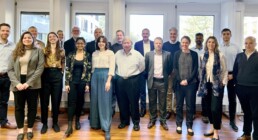
Being a third of the way through this decade of action, there was an increased focus on short and near-term challenges and actions – especially those that can assist the maritime sector in aligning with the temperature goals of the Paris Agreement. Bunge facilitated an open discussion on the opportunities and challenges for near-term sustainability, generating frank conversations between members on current and emerging issues faced – from issues of transparency and human rights within the supply chain to the acute and chronic environmental risks from climate change – and ways to overcome these challenges.
A spotlight session on member action surrounding the Roadmap to a sustainable shipping industry’s vision areas saw members Swire Bulk, Vancouver Fraser Port Authority, RightShip, Standard Chartered Bank, Klaveness Combination Carriers, and Lloyd’s Register present on their sustainability successes and perspectives pertaining to each of the Roadmap vision areas: Oceans, Communities, People, Transparency, Finance, and Energy respectively.
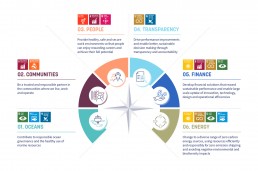
Roadmap to a Sustainable Shipping Industry
From highlighting members’ work in each vision area to a workshop on the future of the Roadmap, both days provided ample opportunity for inspiration. At the end of 2022, SSI embarked on the process of evolving the Roadmap to make it more dynamic. Members participated in a workshop that challenged them to reimagine the future, generating narratives of possible futures. An opportunity to test different methodologies, this workshop gathered greater knowledge on member perception of the future of Oceans as SSI reviews the Ocean vision area to kick off the next evolution of the Roadmap.
Systemic Sustainability
The maritime industry is currently facing multiple challenges at once, from increasing momentum around decarbonising shipping to rising seafarer abandonment cases. At the meeting, members shared their insights on current and emerging sustainability challenges. A significant focus of this was the upcoming Marine Environment Protection Committee 80 (MEPC 80) at the International Maritime Organization, which has implications for the global community’s and the industry’s ability to smoothly align its climate ambitions with the Paris Agreement.
Shipping has the opportunity to future-proof the sector and ensure that its journey to decarbonisation takes place on a 1.5°C-aligned pathway and is done in a systemically sustainable manner that supports all stakeholders. Members heard about the need for an increased level of ambition going forward and the action needed to ensure an efficient and effective transition that respects all stakeholders.

Additionally, Jean-Marc Bonello from Universal Maritime Advisory Series (UMAS) joined virtually for a discussion around the Science Based Target Initiative (SBTi) guidance and target-setting tools for the maritime industry showing a clear pathway in which the private sector can align with the temperature goals of the Paris Agreement.
Finally, day 2 also saw a joint workshop with Anne Katrine Bjerregaard from the Mærsk Mc-Kinney Møller Center for Zero Carbon Shipping and Martha Selwyn from the United Nations Global Compact, around applying just transition principles across green corridor value chains. Raising awareness of the power of each stakeholder, the meeting increased member confidence in their ability to demand change throughout the supply chain.
Future Focus
Hearing and learning from each member’s perspectives is crucial to progressing action within the SSI. The meeting was an opportunity for guests to get a glimpse of the collaboration and openness that SSI membership cultivates. It also provided members and guests with ample opportunity to reflect on and share insights to enable progress for each working group.
2023 will see SSI’s work continue across the three current working groups: from publications in Ship lifecycle to increased focus on transparency and verification for both Delivering on seafarers’ rights and Sustainability criteria for marine fuels.
At the same time, SSI is making changes to the Roadmap so that it becomes a dynamic, living tool to better navigate the constantly evolving sustainability challenges and emerging issues across the shipping value chain. Kickstarting this process is a pilot within the Oceans vision area. If you would like to provide insights or otherwise get involved in this work, please email info@sustainableshipping.org.

Marcio Moura, Global Logistics Director, Bunge – “It was an honour for Bunge and a personal pleasure to host colleagues and peers from SSI at our Geneva office. The productive discussions helped reinforce our shared commitment to developing a more sustainable shipping landscape built on a foundation of reliable science, transparency, and collaboration.”
SSI presents at the Our Ocean Conference

13 March 2023 – On the 2nd and 3rd of March, SSI’s Executive Director, Andrew Stephens, travelled to and spoke at the Our Ocean conference in Panama.
The Our Ocean conference is a high-level event focused on fostering cross-stakeholder partnerships between governments, industry, academia, and civil society. The theme for this year’s conference was ‘Our Ocean, Our Connection’, and focused on knowledge as a basis for action. Every Our Ocean conference sees the announcement of multiple commitments, and this one was no exception. Over the period of two days, over 341 commitments worth nearly $2 billion were made. With topics ranging from deep-sea mining, plastic pollution, overfishing, and shipping, the conference provides the opportunity for all industries and stakeholders to listen and learn from different experiences, problems, and ambitions. At the end of the conference, one thing was clear. We all have a responsibility to current and future generations, to species, and to our planet to move away from our flawed and dominant “business as usual” model.
Although often discussed separately, shipping is a critical stakeholder of the ocean, and the ocean a key stakeholder for shipping. For SSI, this was an opportunity to directly amplify and share our ambition and learnings through participation in two panels. Crucially, it was also an opportunity to listen and learn. Shipping does not operate in its own bubble, and the impacts of our actions reverberate further than we might want to recognise. The conference highlighted the urgent need to take ownership of our actions and impacts today. For shipping, this means playing our part in limiting global temperature increase to below 1.5°C, taking responsibility for safeguarding the oceans we operate in, and acting as a trusted partner in the port and coastal communities we operate with and affect.
"Our Ocean, Our Connection"
Shipping and oceans go hand in hand. We are each other’s key stakeholders, with shipping impacts on oceans ranging from the transport of invasive species, to underwater noise, to harmful washwater discharge from open-loop scrubbers. Shipping is dependent on resilient oceanic and coastal systems – yet, our actions are actively contributing to the opposite of this. This was highlighted during the maritime security panel. Responsible for 3% of global greenhouse gas (GHG) emissions, we are an industry that is actively contributing to environmental degradation, sea level rise, stress on resources, and much more. According to Transport and Environment, if shipping does not change, we will be responsible for 10% of global GHG emissions by 2050. The impact of climate change will disrupt our industry, from increasing re-routing and port infrastructure damage to lower productivity and additional operating costs, and decreased demand for service. According to EDF, ‘without further action to reduce emissions, climate change impacts could cost the shipping industry an additional $25 billion every year by 2100’.
Thankfully, sustainable shipping is possible and necessary. Shipping will remain a critical sector, but it needs future-proofing. According to the Climate Champions and the Getting to Zero Coalition, we need 5% scalable zero-emission fuels in the shipping mix by 2030, rapidly scaling in the 2040s to be on a pathway to zero by 2050. On the Roadmap to a Sustainable shipping industry, SSI calls for 60% reduction in GHG emissions by 2030, and 90% by 2040, to achieve zero by 2050. Although ambitious, these targets are based on a simple fact – we need to start taking action now.
This change goes beyond switching to alternative fuels. We need systemic change throughout the entire shipping lifecycle, from considering well-to-wake impacts of fuel choices to increasing circularity in shipping and including seafarers within this transition. Shipping is the world’s scope 3 emissions, therefore, increased efforts to reduce emissions benefits all. The world needs resilient and sustainable supply chains to adapt and enable sustainable global systems, and shipping has a crucial role to play in this.
The demand for increased sustainability in shipping is coming from all angles, from CoZEV to increased regulation, and this was highlighted in the decarbonising shipping panel. It means companies have much to gain from being early adopters. But shipping’s energy transition is not about gaining a competitive advantage, it’s about securing a future for the sector and creating resilient supply chains that can continue to enable global trade.
“Good for business” is not just an added bonus, instead, it’s rapidly becoming a license to operate in a world with planetary and social boundaries to take into consideration. It is no longer enough to do the bare minimum, and those who do not go beyond will see themselves left behind.
Already, we see the impacts of climate change on shipping. On ports alone, the majority are exposed to natural hazards such as cyclones, earthquakes, and flooding. This is putting $63.1 billion of trade at risk annually, particularly in Small Developing States (SIDS). We live in a critical time. As former UN secretary-general Ban Ki-Moon put it “ours can be the first generation to end poverty – and the last generation to address climate change before it is too late”.
We have the opportunity to do better. Some will say that we can’t afford to do this, but the real question is: can we afford not to?

Andrew Stephens spoke at the Maritime Security Panel, alongside Carlos Del Toro (United States Secretary of the Navy), Iliya Espino De Marotta (Deputy administrator of Panama Canal Authority), Denis Aheto (The Africa centre of Excellence in Coastal Resilience), Cleopatra Doumbia Henry (President of the World Maritime University), and moderated by Major Lloyd Jones, Belize Port Authority Chairman. Watch the panel here.
Andrew Stephens spoke at Decarbonising shipping panel, hosted by US Department of State, Government of Canada, United Nations Foundation, Maersk Mc-Kinney Moller Center for Zero Carbon Shipping (MMMCZCS), High level climate champions and UCL. The panel was moderated by Susan Ruffo (UN Foundation), and Jan-Christoph Napierski, MMMCZCS. Andrew spoke alongside Sue Biniaz (US Deputy Special Presidential Envoy for Climate), and Antonio Dominguez (Maersk, President, Central America, Andina and the Caribbean Sea Area). Watch the panel here.
Swire Bulk becomes newest Sustainable Shipping Initiative member
London/Singapore, 9 March 2023 – Swire Bulk becomes the latest member of the Sustainable Shipping Initiative (SSI), joining ambitious organisations across the maritime ecosystem in working towards a more environmentally, socially, and economically sustainable shipping sector.
Headquartered in Singapore, Swire Bulk is a vessel owner and operator in the dry bulk sector, with a trading fleet of around 150 Handysize and Supramax vessels commercially controlled by eight global offices. The company was first founded in 2012 as a division within the China Navigation Company (CNCo) and separated from CNCo in 2021 to stand alone as the specialist bulk trading arm of the multinational Swire Group.
Swire Bulk is committed to being a leader in sustainability and to contribute to the decarbonisation journey of the maritime sector. The company has already embarked on a number of projects focusing on decarbonisation, alternative fuels, and protecting marine biodiversity as well as being a member of various industry forums. Through membership of the SSI, Swire Bulk looks forward to collaborating with leaders in sustainability across the maritime industry to support progress at a critical time.
“All segments of the shipping sector need to come together to ensure an aligned transition to zero by 2050.” Andrew Stephens, SSI’s Executive Director, said “We are thrilled to welcome Swire Bulk to the SSI family. Having now spent over a decade working closely with Swire Shipping (formerly The China Navigation Company), we look forward to getting to know the Swire Bulk team and learning from their perspective on sustainability needs and priorities”
Swire Bulk’s Chief Executive Officer, Peter Norborg, shared, “As Swire Bulk continues to build and cement its standing in the dry bulk shipping sector, we continue to stay true to our Swire vision – one of which is to set standards on sustainability. Sustainability has never been more important and is always a key topic when engaging with all our customers. Being part of the SSI enables us to be part of the wider green solution, so that we can continue to deliver first-in-class services to our clients while being prudent and responsible towards the environment that we operate in. We are excited to embark on a new chapter and partnership with SSI, and explore more sustainable solutions that will be fit for the future.”
The Sustainable Shipping Initiative (SSI) is a multi-stakeholder initiative that brings together leading organisations with shared goals and equal determination in improving the sustainability of the shipping industry in terms of social, environmental and economic impacts. Ranging from NGOs to shipowners, charterers, banks, and classification societies, SSI members work toward the milestones laid out in the Roadmap to a sustainable shipping industry.
- ENDS -
Notes to Editors
For more information, interviews or comment please contact Elizabeth Petit, Head of Communications & Partnerships, Sustainable Shipping Initiative (e.petit@sustainableshipping.org) and Grace Wong, Corporate Communications Manager, Swire Bulk (grace.wong@swirebulk.com).
About the Sustainable Shipping Initiative
The Sustainable Shipping Initiative (SSI) is a member-led group of leaders catalysing change across the maritime ecosystem. Since 2010, SSI has brought together shipowners, operators and managers; banks and financial stakeholder; cargo owners; classification societies; non-profits; ports; and service providers to advance environmental, social and economic goals for a sustainable shipping industry.
About Swire Bulk
Swire Bulk, the specialist bulk trading arm of the multinational Swire Group, is a leading vessel owner and operator in the dry bulk geared sector with a trading fleet of around 125 Handysize and Supra/Ultramax vessels controlled by eight commercial offices around the world. Its global headquarters is situated in Singapore. Swire Bulk operates one of the most modern and fuel-efficient fleets on the water. With a diversified cargo base and a balanced vessel operating mix between owned and chartered tonnage, Swire Bulk is well-placed to be a long-term partner of choice for its global customer and deliver market-leading, innovative, and sustainable freight solutions.
For more information, please visit www.swirebulk.com
Download this press release as a PDF
SSI presents Sustainability Criteria at the Sustainable Maritime Fuels Forum

At the end of 2022, SSI Head of Decarbonisation Andreea Miu spoke at the Sustainable Maritime Fuels Forum in Berlin. Organised by InventU Renewables, the forum focused on the future of shipping and what measures are in place to build a resilient system.
Andreea was part of a panel discussion on the uptake of sustainable marine fuels, discussing various enabling elements in shipping’s green transition from sustainability assurance to finance and demand-side signals from shipping.
Andreea spoke about SSI’s Sustainability Criteria for marine fuels, highlighting the importance of avoiding ‘carbon tunnel vision’. For shipping to ensure a resilient and successful future, it needs to consider the environmental, social, and socioeconomic issues experienced across the fuel value chain. This ensures that shipping’s future fuel choices are simultaneously part of the wider green transformation and the just transition.
Ship Recycling Transparency Initiative (SRTI) to be hosted by Smart Freight Centre
The Ship Recycling Transparency Initiative (SRTI), hosted by the Sustainable Shipping Initiative since its creation in 2018, has been transferred to Smart Freight Centre from 1 January 2023.
The SRTI was developed as an independent initiative and launched in December 2018 with the objective of bringing together ship recycling stakeholders around transparency, to call for and contribute to a level playing field for responsible and transparent ship recycling.
Since 2018, the initiative has grown to 31 signatories and 14 disclosing shipowners across North America, Europe and Asia, all committed to enabling positive change in the ship recycling sector.
Alongside a committed Steering Group, the Sustainable Shipping Initiative has worked to promote the SRTI and the need for transparency through events and the publication of an annual report.
Now, we are pleased to announce the transition of the initiative to Smart Freight Centre (SFC), an international non-profit organisation focused on reducing greenhouse gas emissions from freight transportation. SFC programs include the Global Logistics Emissions Council (GLEC), Clean Cargo, and the Sustainable Freight Buyers Alliance (SFBA), bringing expertise with data-driven initiatives that make it a natural fit to be the new host for the SRTI.
Looking ahead, we wish the SRTI community and Smart Freight Centre all the best and look forward to continued collaboration between our initiatives.
For any questions, please reach out to srti@smartfreightcentre.org
COP15 deal struck to protect biodiversity
Progress against milestone 1.2040.2:
High seas and coastal marine protected areas are established and enforced, and marine spatial plans are in place
The 15th session of the United Nations Biodiversity Conference (COP15) took place from 7 to 9 December 2022. It ended with a historic agreement on a ’30 by 30′ target.
COP15 resulted in the adoption of the Kunming-Montreal Global Biodiversity Framework (GBF) which aims to address biodiversity loss, restore ecosystems, and protect indigenous rights. Included in this framework is putting 30% of the planet and its ecosystems under protection by 2030.
EU ETS to include shipping emissions
Progress against milestone 6.2030.2:
Mid- and long-term measures implemented and national regulation incentivising and ensuring the uptake of zero (or low) carbon fuels and technologies in place.
The European Union Emission Trading Scheme (EU ETS) is being extended to include emissions from shipping.
Under the agreement, emissions from the ETS sectors must be reduced by 62% by 2030, with free allowances disappearing by 2034. The scheme will cover greenhouse gasses such as carbon dioxide, methane, and nitrous oxide.
Source: European Parliament.
SBTi maritime guidance
Progress against milestone 6.2020.3:
Technical and operational energy efficiency measures, including the adoption of a circular approach and science-based targets, are introduced and business models for low and zero carbon shipping incentivised.
The Science Based Targets initiative (SBTi) have launched framework for the shipping industry to set near- and long-term science-based targets in line with 1.5C.
The guidance will assist ship owners, operators, and those setting supply chain emission targets associated with maritime trade.
Source: Science Based Targets Initiative

